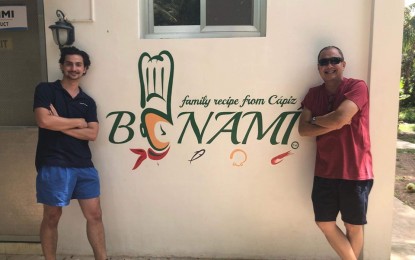
HELPING THE NEIGHBORS. Felix Guelfucci (left) and Jose Antonio Morente (right), Gawad Kalinga volunteers and founders of Bonami Food Products, empower local fishermen and farmers in Capiz province. Bonami produces high quality food and most of their raw products come from fishermen near their location.(Photo courtesy of Jose Antonio Morente)
ILOILO CITY -- Being the seafood capital of the Philippines, Capiz province can take pride not only of its fresh catch but also for the world-class food produced from its seas.
Through a food processing social enterprise, local fishermen and farmers in Capiz provide quality raw materials to Bonamí Food Products.
Bonamí Food Products is the brainchild of two Gawad Kalinga volunteers, Filipino Jose Antonio Morente and French Felix Guelfucci. Gawad Kalinga is a poverty alleviation and nation-building movement.
Guelfucci shared that Bonamí aims to uplift local communities by providing locals access to quality food products.
Bonamí is a play on words between “bon ami” which means “good friend” in French, and “b! name” which means “wow! delicious” in Hiligaynon.
“We create a very high-quality product from a very local production, and our products are made between the partnership of a proud Filipino and proud French,” Guelfucci told the Philippine News Agency (PNA) in an interview over the weekend.
Food products processed by Bonamí are seafood meal enhancers, ready-to-eat appetizers, sweet and savory snacks, jams, among others.
Guelfucci said Bonamí saw the need for the fishermen to be empowered as industrial fishing boats started to take space in Capiz seas.
Most of their raw products come from fishermen who are geographically near.
“The best way is to start with our neighbors and have a very strong community of fisherfolks in Dumalag (a nearby town). We want to help our neighbors first and eventually, spread the help,” he said.
Bonamí gets raw products from the fishermen at a fair price as they aim to “make the fishermen grow while Bonamí also grows”.
Also doing its part for environmental conservation, Bonamí products are packaged in bottles. Packaging Capiz seafood products in bottles also make it compete in the global market, he said.
Meanwhile, Morente has appreciated the help of the government, particularly the Department of Science and Technology (DOST).
“It is also one of our advocacies to bridge the gap between our government agencies and the private sector, and I realized that without our government’s help it would really make it hard for us,” he said.
The DOST has provided Bonamí with financing through the “Small Enterprise Technology Upgrading Program Innovation System Support Fund” which made Bonamí able to acquire its processing machines.
Bonamí products were also accredited by the DOST, he said.
“I’m happy now that I am working with DOST. I always tell that to all the people, to ask for our government’s help,” he said.
Aside from sourcing its raw materials from fisherfolks, Bonamí also has the mission to tackle the pressing need of nutrition through a feeding program Bonameal.
Guelfucci shared that Bonameal, which will be implemented in public schools, will kick off as soon as they complete the documents needed.
Bonamí also works towards its long-term solution to provide local communities access to education, capital and business creation or job opportunities.
Morente emphasized that Bonamí understands that fishermen and farmers in local communities also want to buy not only their needs but also their wants.
“We always have hope,” he said. (PNA)
